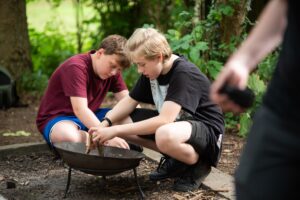Tamsin Messeter is a practising Educational Psychologist and one of the many experts who we collaborated with to create our Little Troopers Secondary School Military Child Wellbeing Course template. In this guest blog, Tamsin tells us about the science behind ‘resilience’, why it’s not a fixed trait and how supporting a child’s emotional literacy is key to fostering positive well-being. She also offers advice to teachers using the Little Troopers secondary school Wellbeing Course template.
As an Educational Psychologist, I was excited to be approached to contribute to the work of Little Troopers and specifically to help develop some of the charity’s school resources. Before becoming a psychologist I worked as a primary school teacher and I have also had some personal experience of military life in the past.
I recall teaching a young girl whose father was on tour at the time. I remember thinking I didn’t feel very well equipped to support her through a period which was undoubtedly one of the most challenging in her life. She didn’t require any specialist teaching and didn’t need treating differently to her peers, but what she did benefit from was some extra time to talk in a safe space. It was important for her to have an opportunity to explore how she was feeling, which was completely natural given the circumstances. She needed validation for her feelings and to know that she was cared for in her school environment. Fortunately, as I was experiencing the very same emotions as her at that time, I intuitively became an ally for her in school and was able to empathise with the daily rollercoaster of feelings and seemingly random triggers for sadness. This experience did get me thinking that as a teacher, I would have appreciated some resources to draw upon at this time which is why I was delighted to learn about the Little Troopers Military Child Well-being Course for schools and even more delighted to be able to design two sessions for the secondary school course template
Educational Psychologists (EPs) use psychoeducation to promote wellbeing and resilience in children and young people. We have a particular interest in using psychological theory evidence-based research and techniques to work with young people and those around them (their families and schools) in order to promote children’s social and emotional well-being and development.
Emotional health and well-being is important for all pupils; the current context of the Covid-19 pandemic is just one example of how in contemporary society, children and young people are faced with challenges related to their emotional maturation. However, it has further significance for pupils who are regularly mobile and those likely to experience challenging events, such as service children. For children to develop positive emotional well-being, they need to be emotionally aware and this means recognising feelings in themselves and others. The term ‘emotional literacy’ refers to the practice of recognising, understanding, appropriately expressing and managing emotions in others and ourselves (Faupel, 2003). Children develop these emotional literacy skills over time through experience and there are ways for adults to support with this. These skills will also help children to be resilient.
Resilience is the ability to recover from difficulties and is a term central in positive psychology. There are a number of protective factors such as having certain traits which can contribute to resilience. However, it is more recently recognised that resilience is not a fixed trait we are born with but is now understood as an ongoing process of interactions between a person and the world. Each time resilience is called for, the child or young person requires consistent, caring relationships to increase capacity for coping. These relationships can be with peers and teachers who are able to demonstrate empathy for the child and situation.
It is for the reasons above that a key focus in the Little Troopers Military Child Wellbeing Course is a focus on emotional awareness and resilience.
How to use the resources
The secondary school Well-being Course template considers emotional awareness and resilience at its heart and draws upon theory related to positive psychology. To be emotionally literate is to believe in your own strength and see positive possibilities. Teachers can use the resources to help address the concepts of change, transitions and managing feelings through focusing on the language of emotions and fostering positive relationships. Schools can support service pupils by using these resources to empower children and young people to recognise their strengths. Military children who take part in the Well-being Course should enjoy collaborative activities with peers who are able to empathise with them. For school staff, there should be an increased confidence in using language for emotions and resilience with pupils. Having a sense of belonging and a connection with others is now recognised as being fundamental for resilience which is why the resources have been designed to be delivered in small, active groups of students so that the young people taking part can connect with each other and discuss how they are similar.
Fundamentally, the Little Troopers resources offer teachers a tool to help service students explore their emotions and to have a voice. Having agency and being heard are important for resilience and well-being. Young service children should have the opportunity to talk together about things that concern them and matters related to their futures and schools are a natural and neutral place for these conversations to take place.
Faupel, A. (2003). Emotional literacy: assessment and intervention; ages 8 to 11. Southampton Psychology Service. London: Nfer Nelson Publishing Company Ltd.






